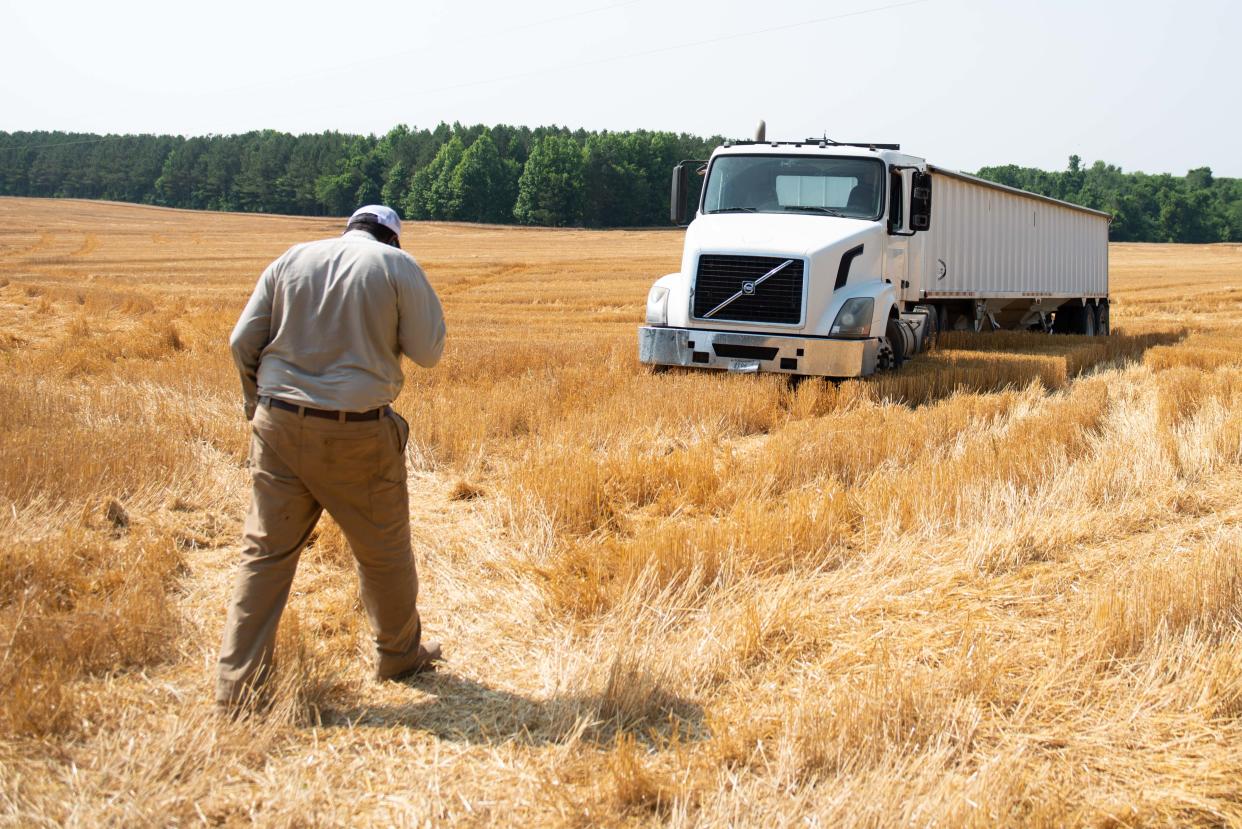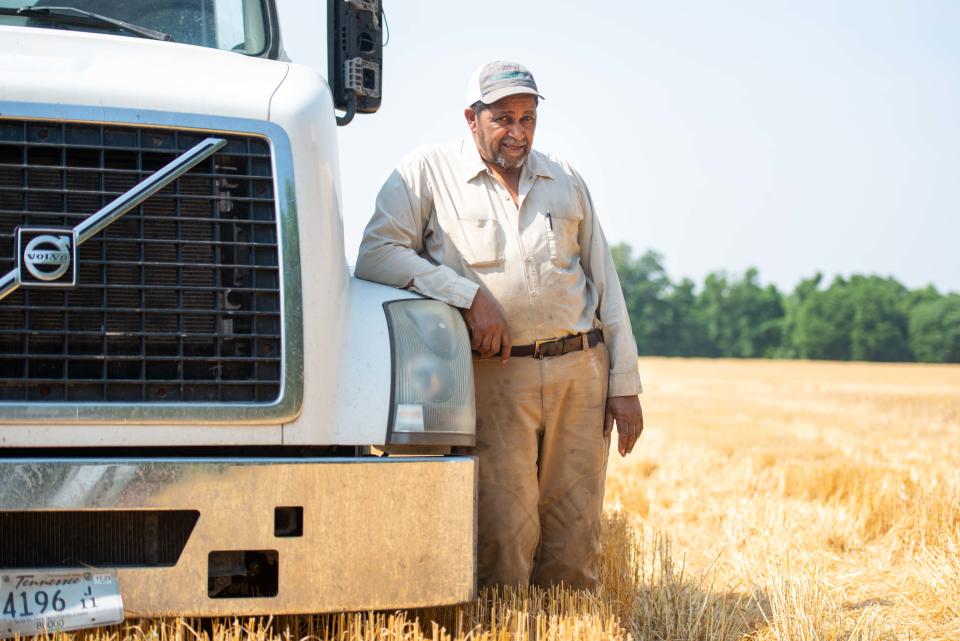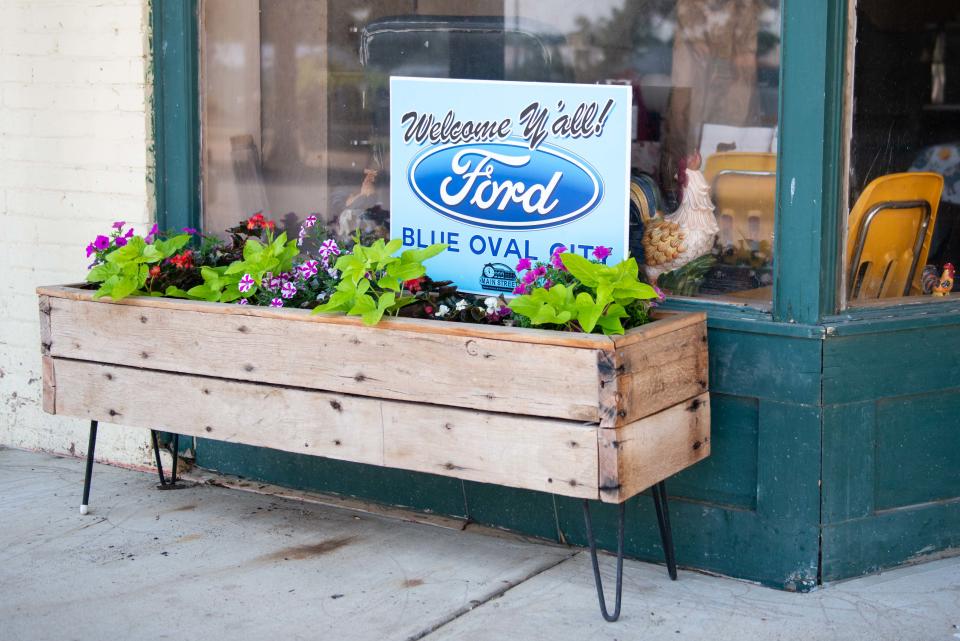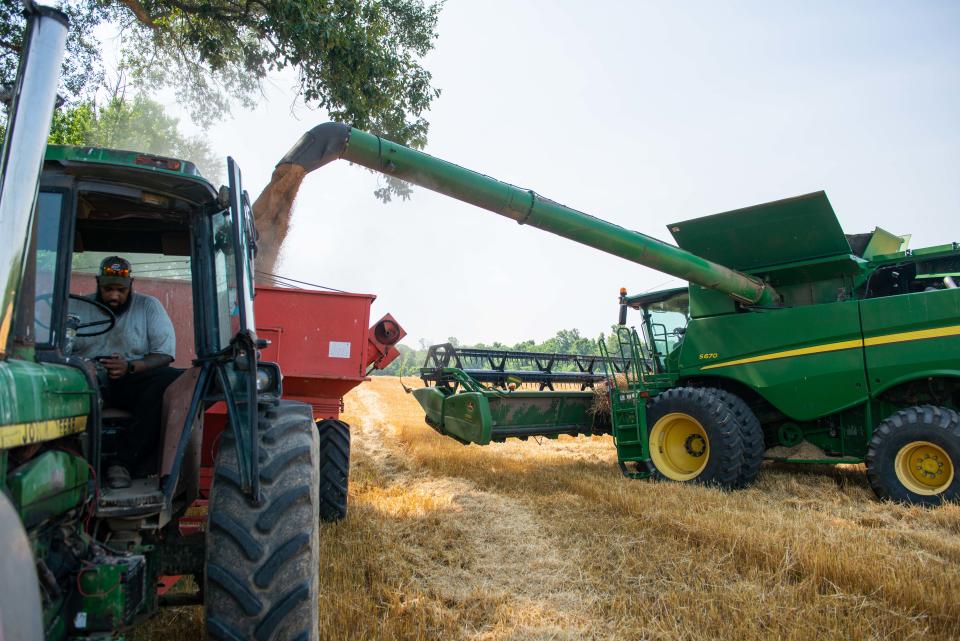Black farmers have lived here for generations. Now, a Ford plant is changing the landscape.

- Oops!Something went wrong.Please try again later.
Inette Wilks has seen big changes in the tiny farming town of Stanton, Tennessee, since Ford broke ground here last year on a $5.6 billion electric truck megaplant slated to bring thousands of jobs to the region.
Trucks filled with construction debris barrel down once-quiet country roads as cranes dot the grassy skyline. At lunchtime, hungry construction workers line up at Wilks’ small business, the Variety Stop N-Go, eager for her fried chicken and homemade lasagna.
In another sign of change, Wilks said, “For Sale” signs are popping up on the surrounding farmland as farmers look to cash in on plans for future development. Some are from the area’s historically Black farming community – one of the last in Tennessee.
“We all know changes are coming,” Wilks said. “It’s going to look completely different here in a few years.”
While the Ford construction has been a boon for business owners like Wilks, not everyone is benefiting.

In a push to build a new highway to the coming Ford plant, the Tennessee Department of Transportation is using eminent domain to seize land from a group of Black farmers and landowners in Stanton and surrounding Haywood County.
The farmers, including some whose families have owned their farmland here for generations, say the state is taking their land while offering them a fraction of what it’s worth.
They’re now battling the state in court and have gained public support from the NAACP and the Legal Defense Fund.
John Boyd Jr., a fourth-generation Virginia farmer and president of the National Black Farmers Association, said Black farmers have long struggled with discriminatory laws and federal lending policies, as well as land loss due to interstate highway systems.
Uneven Ground: Exceptional Black farmers and their fight to flourish in the South
And with younger generations reluctant to take over family farms, their numbers keep dwindling.
“Our farmers are expected to compete with megafarms today, and they just don’t have the resources to do it,” he said. “We’re facing extinction.”
A study last year published in the American Economic Association’s Papers and Proceedings journal found that Black farmers in the 20th century lost roughly $326 billion worth of acreage, according to present-day value.
While they owned more than 16 million acres in 1910, that number had dropped to 4.7 million by 2017, accounting for less than 1% of all agricultural sales, according to the most recent census of agriculture.
As of 2017, Tennessee had an estimated 1,422 Black farmers.
Boyd said that number will likely continue to drop as small farmers, like the ones in Haywood and Henderson counties, face change and development.
“Once they lose that land, it’s never coming back,” he said.
A boon for Haywood County
Haywood County has a Black population of just over 50% and is about an hour east of Shelby County, home to Memphis and the only other majority Black county remaining in Tennessee. Haywood is the only majority Black county where agriculture has remained one of its most important industries.
Haywood had a rich cotton industry based on slave labor before the Civil War. After emancipation, many planters hired formerly enslaved people as tenant farmers.
In 1939, the Farm Security Administration established the Haywood County Farm Project in Stanton to give Black families an opportunity to rent and eventually own small farms. About 39 families participated in the program.
The county seat of Brownsville is quaint with historic buildings but few job opportunities. So when Ford announced its plan for a megasite called BlueOval City in nearby Stanton, the company was welcomed with open arms.
The project, the largest investment in Tennessee history, is slated to transform the region with an estimated 27,000 new jobs (direct and indirect) and more than $1 billion in annual earnings for workers, according to state estimates.
Blue signs saying, “Welcome Y’all! Ford BlueOval City” dot the windows of small businesses throughout Brownsville.

Tammy Barr, a Brownsville native who sits on several city commissions, said the small town with just 10,000 residents is now planning for big developments with new hotels, restaurants and homes.
As big business rolls in, city leaders are working carefully to preserve the town’s charm, she said.
“We want to keep its character and certainly its historic value,” she said.
But Barr and others are concerned that some longtime residents will be displaced since rents have doubled over the past year as investors buy up properties in anticipation of a population boom.
Local real estate agent Joey Conner said he had his biggest sale ever last year when an investor out of Memphis bought 55 homes in the county for $5.6 million. Property sales here have jumped 40% since Ford came in, he said.
Farmland is also selling fast, with potential investors from California and Texas showing interest, Conner said. Real estate websites show farmland listed for tens of thousands of dollars an acre in proximity to BlueOval City.
While big for Haywood County, Conner, who grew up here, said he hopes it doesn’t completely change the landscape.
“We’ve always been a poor county so it's a blessing to have this coming here," he said. "But at the same time, we don’t want to hurt the people in the community who have worked hard all these years."
A family history
Farmer Marvin Sanderlin, 68, is one of those hard-working people.
The son of sharecroppers, Sanderlin now owns 400 acres of farmland. This year, he received notice that the state planned to use eminent domain to take 10.8 acres of his land in Stanton for a road to BlueOval City.
The road would run directly through a plot of pine trees he plans to farm for timber one day. He said he was shocked when the state offered him what he said was a lowball sum of $36,550, amounting to around $3,600 per acre.

Sanderlin said surrounding land is going for several times that amount and is expected to skyrocket in the coming years with Ford’s development.
Standing near a soybean field as his son Matthew, 39, runs the tractor, Sanderlin said he’s long fought for the rights of Black farmers and in the past has petitioned Congress for debt relief and fair loans. He said he just wants the state to offer fair market value for his property.
“We always get cheated,” he said. “It’s not about the money. It’s about the general principal.”
The Tennessee Department of Transportation spokesperson Nicole Lawrence said in a statement federal laws protect property owners in eminent domain cases and that all land offers for the new road to service BlueOval City reflect fair market value, as determined by an independent appraiser.
Nonetheless, the state Attorney General’s Office has requested a second opinion appraisal for the properties, except for those where the families have already settled with the state. TDOT is planning to acquire 31 tracts of land for the road, of which eight cases were still pending as of May 10, Lawrence said.
“If an agreement cannot be reached, TDOT will turn the case over to the Tennessee Attorney General’s Office to acquire the land through legal proceedings,” Lawrence said. “The property acquisition process is not something TDOT takes lightly, and we always ensure we follow the federally mandated process.”
The planned highway, which will provide a quicker connection from Interstate 40 to BlueOval, will also run through the property of Ray Jones, paving over a spring his great grandfather Wesly Jones discovered in 1930.
The water turned out to be rich in minerals, and the Jones family began selling it in bottles for its healing alkaline properties, drawing people from across the state.
The spring hasn't been touched in many years, but Ray Jones, a retired school teacher and head of the local Boys & Girls Club, said he had hoped to once again sell the water with Ford coming to town.
Instead, the state in January notified him that it planned to take an acre of his property with the mineral spring, offering him less than $10,000.
The offer is grossly low, he said.
“It’s not just the price of that one acre of land; it’s the fact that there is a little water spring there,” he said. “It’s part of our family. It’s part of our heritage, so it’s not something you want to lose. But if we have to lose it, we feel like we should be compensated more than just 'fair market value.'”
Jones, Sanderlin and a handful of other landowners are planning to fight the case in court and are working with the NAACP to hire their own land appraisers.
A Ford spokesperson in a statement said it is committed to being a good neighbor and has encouraged TDOT to meet with the property owners for an equitable resolution.
Despite the dispute, Jones said he 100% supports BlueOval City and the changes it will bring to his hometown of Brownsville.
“We all want to see our city thrive, and it is thriving,” he said. “But with thriving, there comes growing pains.”
This article originally appeared on Nashville Tennessean: New Ford battery plant changes landscape for Tennessee Black farmers

